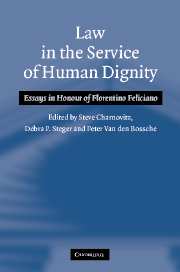Book contents
- Frontmatter
- Contents
- List of contributors
- Preface
- Biographical note
- List of abbreviations
- PART I Reflections on the contributions of Florentino Feliciano to international law
- PART II Insights into the World Trade Organization
- PART III The changing landscape of investment arbitration
- 17 The reshaping of the international law of foreign investment by concordant Bilateral Investment Treaties
- 18 ICSID arbitration and the state's increasingly remote consent: apropos the Maffezini case
- 19 The notion of investment in recent practice
- 20 Arbitration of investment disputes under UNCITRAL Rules and the choice of applicable law
- PART IV New challenges in international adjudication
- Bibliography of works by Florentino Feliciano
- Index
20 - Arbitration of investment disputes under UNCITRAL Rules and the choice of applicable law
from PART III - The changing landscape of investment arbitration
Published online by Cambridge University Press: 29 July 2009
- Frontmatter
- Contents
- List of contributors
- Preface
- Biographical note
- List of abbreviations
- PART I Reflections on the contributions of Florentino Feliciano to international law
- PART II Insights into the World Trade Organization
- PART III The changing landscape of investment arbitration
- 17 The reshaping of the international law of foreign investment by concordant Bilateral Investment Treaties
- 18 ICSID arbitration and the state's increasingly remote consent: apropos the Maffezini case
- 19 The notion of investment in recent practice
- 20 Arbitration of investment disputes under UNCITRAL Rules and the choice of applicable law
- PART IV New challenges in international adjudication
- Bibliography of works by Florentino Feliciano
- Index
Summary
Arbitrating bilateral investment treaties disputes under UNCITRAL rules: CME and Lauder v. Czech Republic arbitrations (1999–2001)
A recent international investment dispute, the CME and Lauder v. Czech Republic arbitrations, has attracted widespread attention beyond specialized circles, for a number of peculiarities.
This is possibly the first publicly known dispute under a bilateral investment treaty (BIT) decided through international commercial arbitration proceedings (in accordance with the UNCITRAL Rules) instead of within ICSID. The national courts of the country where the award was rendered, in casu Sweden, have had to decide the challenge to set aside the award brought by the losing state in accordance with the local arbitration statute. Under the ICSID Convention, by contrast, no such control by national courts would be admissible. The same acts by the Czech Republic were subject to two separate arbitrations at the same time: this has highlighted the conflict of procedures, of governing treaty provisions and of awards that the intricate, non-coordinated network of bilateral investment treaties may entail, when international commercial arbitration is resorted to, thus potentially bringing a backlash to the legal security surrounding international investments. On the other hand, the speedy completion of all litigation (including full payment by the state concerned), notwithstanding these complexities, indicates that international commercial arbitration, when available under relevant BITs, may be an alternative practicable avenue for aggrieved investors.
- Type
- Chapter
- Information
- Law in the Service of Human DignityEssays in Honour of Florentino Feliciano, pp. 276 - 298Publisher: Cambridge University PressPrint publication year: 2005



